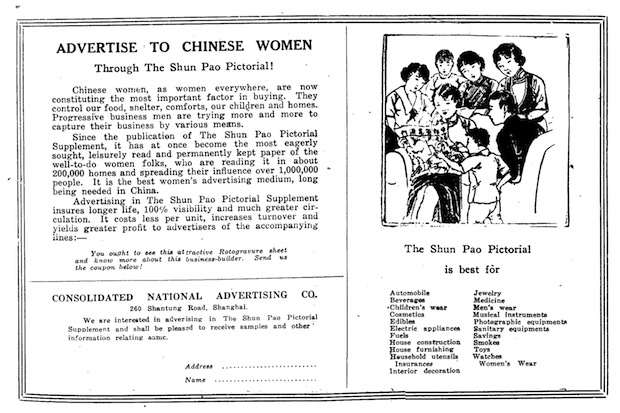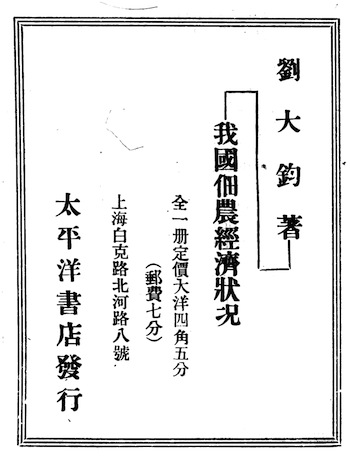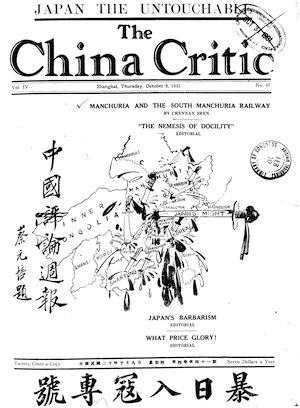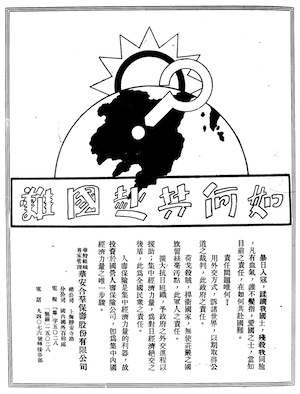FEATURES
The China Critic - 1931 | China Heritage Quarterly
The China Critic: a Chronology
William Sima
Australian Centre on China in the World
William Sima, whose research into the history and contents of The China Critic led to this combined issue of China Heritage Quarterly, has created a Chronology of the weekly. It follows the progress of The Critic from its first appearance in May 1928 through the highs and lows of the 'Nanjing Decade', and then through its various wartime permutations.
Will's Chronology, which is arranged by year below, accounts for the changing fate, and the friable editorial stance, of The Critic. It also provides numerous links to the articles under discussion allowing for them to be appreciated in an historical context.—The Editor
1928 | 1929 | 1930 | 1931 | 1932 | 1933 | 1934 | 1935 | 1936 | 1937 | 1938 | 1939 | 1940 | 1945
1931
1 January

Fig.1 The Shenbao 申報 Pictorial calls for advertising to Chinese women, 1 January
The Editorial 'What We Believe' reaffirms The China Critic's mission to pursue 'truthfulness and impartiality' as guiding principles to promoting better understanding between China and other nations:
As was our aim at the beginning, we have always strived to promote a better understanding between China and all other nations. We have tried to represent China as she really is, neither what our ultra-patriotic people would like to make out of her, nor what the anti-Chinese foreign propagandists would have the outside world believe… . Being better acquainted with foreign institutions and foreign ideals, we feel it out duty to make them better understood by our compatriots, and at the same time re-evaluate our own institutions from the western point of view. Hence our criticism of our own civilization and culture… . The Critic may therefore be regarded as either nationalistic or internationalistic, because we strive to be both.
26 February

Fig.2 An advertisement for 《我國佃農經濟狀況》, by D.K. Lieu 劉大鈞, The China Critic's advisory editor, 8 January
To mark the establishment of the Sinologial Institute (Sinologish Instituut) at Leiden in the Netherlands, the Editorial 'The Future of Sinology' comments upon increasing scholarly interest about China in the West. It includes excerpts from a speech by the Dutch Sinologist Jan Julius Lodewijk Duyvendak, the director of the Institute:
And for Holland, sinology has a particular significance. The study of sinology has in the past been motivated by purely utilitarian considerations. The absence of that disinterested motive of scholarship is indeed a defect which it is one of the purposes of the Institute to remedy.
The writer of the Editorial praises the increasing interest in promoting sinology for 'purely scholarly' reasons. Because 'modern scholarship has become an international affair', he proposes that the new Dutch institute establish relations with Chinese centers of learning, notably the Academia Sinica.
12 March
This week's 'Little Critic' essay, 'What Liberalism Means', provides an insight into Lin Yutang's 'liberal' perspective. Lin argues that everybody is a 'die-hard' when it comes to things like tastes in food and conservatism regarding women's clothing; 'liberalism', on the other hand, is 'only an attitude of mind, a way of thinking', that is constantly fighting an uphill battle against the ingrained force of die hard conservatism: 'die-hardism is popular, while liberalism is not. Die-hardism has a biologic basis, while liberalism is a late development of the human mind without the backing of instincts.' As difficult as liberalism is, therefore, to attain, Lin Yutang argues that in the modern cosmopolitan world, it is essential for it to grow alongside material progress:
Cosmopolitanism has arrived whether we will or not. The radio, the aeroplane, the automobile and television are all bringing the world closer together… . This cosmopolitanism, I am afraid, is a one-legged development. Material cosmopolitanism is so far largely a rich man's cosmopolitanism. But whether it be rich man's or poor man's cosmopolitanism, there is urgent need of a corresponding growth of the liberal attitude of mind, and a more intelligently guided control of the surviving savage herd instinct… . There is therefore a great need for our consciously inculcating this new attitude of mind and thus meeting our evident discrepancy between our material conquests and our mental equipments.
7 May

Fig.3 The China Critic front cover, 8 October
Having declared on 30 April that the popular column 'Little Critic' would be suspended during Lin Yutang's absence at the League of Nations, this week it is announced that T.K. Chuan 全增嘏 will assume editorship of the column. Henceforth, 'Little Critic' is largely in the hands of Chuan and other contributors.
11 June
Echoing The China Critic's call for a more humanistic patriotism, Pearl S. Buck proposes 'The New Patriotism'.'Young Patriots', she writes, 'I whom you would call a foreigner, I stand humble … before the quality of your common people, the farmer, the wheelbarrow man, the small shop keeper, the silk weaver… .'
Buck presented a longer version of 'The New Patriotism' in October 1933, which was translated to Chinese by Lin Yijin 林疑今, and published in Lin Yutang's Analects Fortnightly that same month. We have included both versions of this essay in the 'Features' section of this issue, under the title 'On New Patriotism.'
18 June
The headline Editorial 'The New Patriotism' endorses Pearl Buck's essay of the previous week and lists a number of previously published China Critic articles that accord with Buck's underlying message of civic consciousnessand empathy for the poor:
Let Mrs. Buck's article be a perpetual warning for all of us, including us of the Critic, so that snobbishness may be forever banished from this land and a broader, larger understanding may come to us through a sympathetic contact with the unfortunate, the unknown, and the unhappy.
24 September

Fig.4 '如何共赴國難?'—'How can we work together to save the country?': the 'China United Assurance Society Ltd' 華安合群保壽股份公司 calls for more investment during this time of national crisis, 15 October
《讀書問題》, 'The Problem of Reading', 29 October
After the 'Mukden Incident' 九一八事變 of 18 September, the cover of this week's China Critic features in block letters: 'Japan the Untouchable', with '暴日入寇專號' running along the bottom of the page. In the following weeks the cover would feature a cartoon depicting Japanese expansionism. A 'Special Notice' on the contents page of this issue reads:
Almost six months ago we found occasion to warn the public of the imminent danger in Manchuria. Unfortunately our prediction has come to pass. In presenting this special issue we have been guided by the principle that truth speaks louder than propaganda. The following pages contain undisputable facts which, in our belief, would assist the public in understanding the present crisis so dramatically precipitated by Japan's invasion of Manchuria—The Editors.
Beginning with this issue, The China Critic published only 'Editorials' and 'Special Articles', with reportage until early 1932 focusing overwhelming on Japanese affairs. Other columns, such as 'Women's World', 'Little Critic' and 'Book Review', are suspended until mid-December.
17 December
The 'Little Critic' and 'Book Review' columns resume this week, and the 'Women's World' column the following week. This issue also carries an obituary for Xu Zhimo 徐志摩, 'The Death of a Poet'.
31 December
'The Little Critic's Peace Plan' by T.K. Chuan demonstrates that this column could indeed 'bark humanely' during even the most testing times. Chuan claims thathe has 'carefully thought out a plan for lasting world peace'; it turns out to be a series of tongue-in-cheek methods for controlling the 'pugnacious instincts' of military men. He suggests a boxing match between 'Kid Honjo, The Kwantung Terror' and ' “Shorty” Ma, The Hailun Whirlwind'—referring to general Shigeru Honjō 本庄繁 of the Japanese Kwantung Army, and the Nationalist General Ma Zhanshan 馬占山. Chuan also proposes banning uniforms and military paraphernalia, 'since these articles add to the martial splendor and are the reasons why girls lose their virginity', and'lastly', he concludes, 'to further provide for the sadistic impulse of man an outlet, perhaps we might encourage fox-hunting, bull-fighting, pig-sticking, wife-beating and other similar sports.'
[Fig.5 An advertisement for Quentin Pan's new book 《讀書問題》, 'The Problem of Reading', 29 October]
1928 | 1929 | 1930 | 1931 | 1932 | 1933 | 1934 | 1935 | 1936 | 1937 | 1938 | 1939 | 1940 | 1945
|